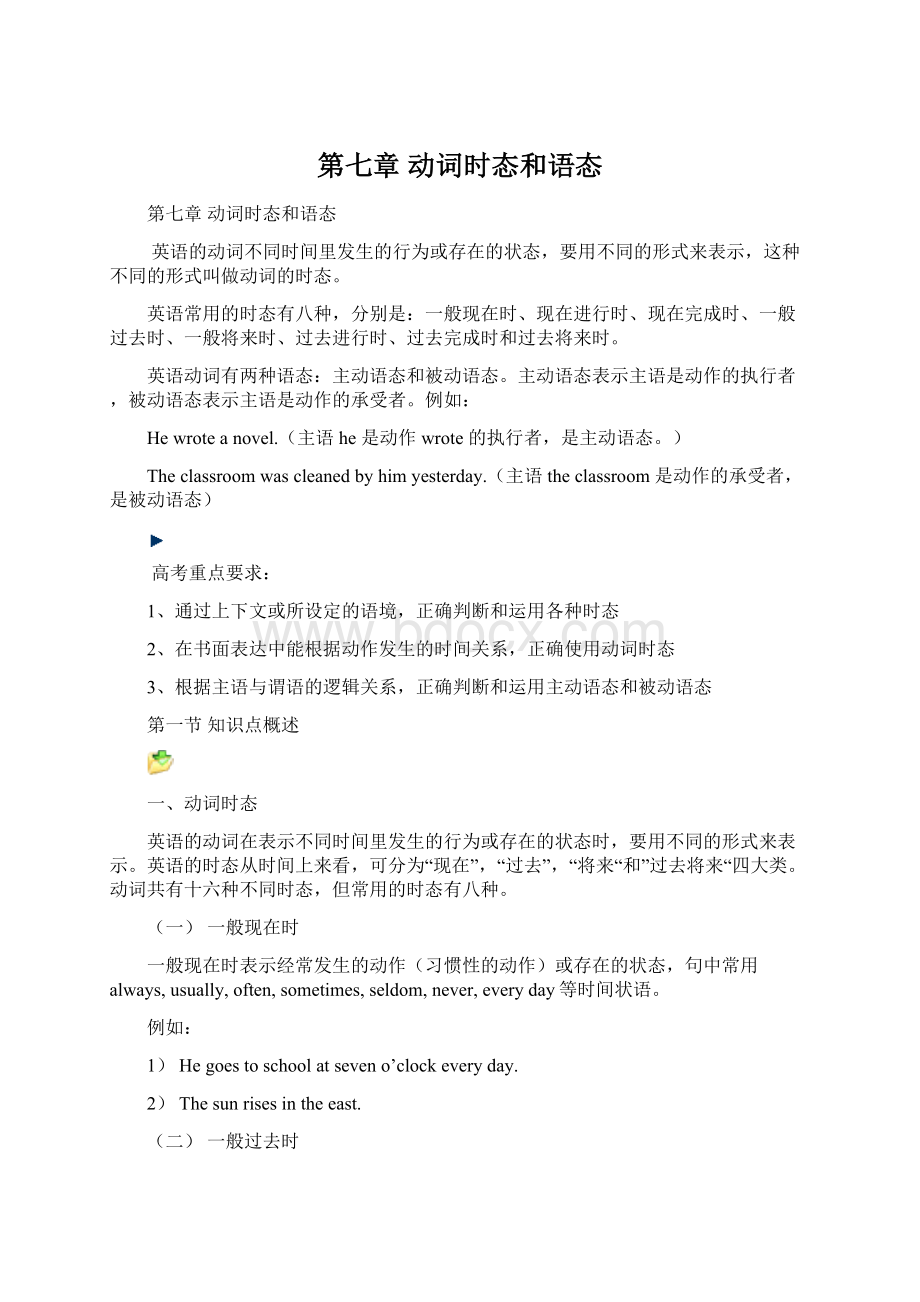第七章 动词时态和语态.docx
《第七章 动词时态和语态.docx》由会员分享,可在线阅读,更多相关《第七章 动词时态和语态.docx(12页珍藏版)》请在冰豆网上搜索。

第七章动词时态和语态
第七章动词时态和语态
英语的动词不同时间里发生的行为或存在的状态,要用不同的形式来表示,这种不同的形式叫做动词的时态。
英语常用的时态有八种,分别是:
一般现在时、现在进行时、现在完成时、一般过去时、一般将来时、过去进行时、过去完成时和过去将来时。
英语动词有两种语态:
主动语态和被动语态。
主动语态表示主语是动作的执行者,被动语态表示主语是动作的承受者。
例如:
Hewroteanovel.(主语he是动作wrote的执行者,是主动语态。
)
Theclassroomwascleanedbyhimyesterday.(主语theclassroom是动作的承受者,是被动语态)
高考重点要求:
1、通过上下文或所设定的语境,正确判断和运用各种时态
2、在书面表达中能根据动作发生的时间关系,正确使用动词时态
3、根据主语与谓语的逻辑关系,正确判断和运用主动语态和被动语态
第一节知识点概述
一、动词时态
英语的动词在表示不同时间里发生的行为或存在的状态时,要用不同的形式来表示。
英语的时态从时间上来看,可分为“现在”,“过去”,“将来“和”过去将来“四大类。
动词共有十六种不同时态,但常用的时态有八种。
(一)一般现在时
一般现在时表示经常发生的动作(习惯性的动作)或存在的状态,句中常用always,usually,often,sometimes,seldom,never,everyday等时间状语。
例如:
1)Hegoestoschoolatseveno’clockeveryday.
2)Thesunrisesintheeast.
(二)一般过去时
一般过去时主要用于表示过去的动作、行为或状态,句中常有yesterday,ago,in1989,once,lastweek(month,year),atthattime,justnow等时间状语。
例如:
1)Hewasbornin1989.
2)IusedtoplayfootballwhenIwasyoung.
(三)一般将来时
英语动词表示将来时间有多种形式,其共同特点是句中常有表示将来时间的状语,如:
tomorrow,nextweek,inaweek等
例如:
1)Wewillvisitthesciencemuseumnextweek.
2)Wearegoingtodiscusstheproblemtomorrow.
(四)现在进行时
现在进行时表示现在时刻正在进行的动作或表示现阶段正在做的事情,句中常与now,atthismoment等时间状语连用。
例如:
1)Theboyisplayingvideogames.
2)Hisfatheriswritinganovelthesedays.
(五)现在完成时
现在完成时表示从过去某一时刻开始一直延续到现在的动作或状态,或还要延续下去,句中常用since,for,yet,already等表示一段时间的状语。
例如:
1)GreatchangeshavetakenplaceinChinasince1980.
2)Hehasbeeninthisfactoryforfiveyears.
(六)过去进行时
过去进行时表示在过去某个时候正在进行的动作或过去某个阶段正在做的事情。
例如:
1)Hewasreadinganinterestingbookthistimeyesterday.
2)WhenIcamein,theywerehavingsupper.
(七)过去完成时
表示在过去某个时刻前已经发生的动作或状态,或者从过去某个时刻开始一直延续到过去另一时刻的动作或状态。
例如:
1)Bytheendoflastyear,wehadlearnedmorethan2,000Englishwords.
2)Myteacherhadtaughtinthatschoolfortenyearsbeforeshecamehere.
(八)过去将来时
过去将来时表示从过去的观点来预计以后要发生的动作或存在的状态,这种时态常用于宾语从句当中,主句中的谓语动词一般是过去时。
例如:
1)Hesaidthathewouldstudyharderthanbefore.
2)Hedidn’ttellmewhenhewouldgo.
二、被动语态
(一)被动语态的构成
英语动词的被动语态由助动词be+及物动词的过去分词构成。
助动词be必须与主语的人称和数保持一致,并有时态的变化。
例如:
Themanwasfooledbythetwoboys.
Thebookhasbeentranslatedintoseverallanguages.
(二)被动语态的用法
(1)动作的执行者不知道是谁或难以说明时常用被动语态。
例如:
Streetlightsareoftenturnedonatsixinwinter.
Thenewtestbookwillbeusednextterm.
(2)当动作的承受者比起动作的执行者来说更能引起人们的关心而需要加以强调时,要用被动语态。
例如:
Thiskindofbicycleisnotsoldinourshop.
Thethiefwascaughtbyapolicemanyesterday.
(3)含有双宾语的句子,主动句中的间接宾语或者直接宾语都可变为被动语态中的主语,另一个保留不变。
变为主语的若是主动句中的直接宾语,间接宾语前则需加介词to或for。
例如:
Thepianistgavethepupilssomeadvice.
间接宾语直接宾语
→Thepupilsweregivensomeadvicebythepianist.
→Someadvicewasgiventothepupilsbythepianist.
(4)在主动语态句中动词make、have、let、see、watch、hear、feel等后接动词不定式作宾语补足语,动词不定式不加to。
但变成被动语态时后面的不定式都须加上to。
例如:
Thebossmadethemworktenhoursaday.
→Theyweremadetoworktenhoursadaybytheboss.
Aboysawhimenterthehouse.
→Hewasseentoenterthehouse.
(三)被动语态的时态
(1)一般现在时
构成:
助动词am/is/are+动词的过去分词
例如:
ThiskindofcarismadeinShanghai.
Englishisspokeninmanycountries.
(2)一般过去时
构成:
助动词was/were+动词的过去分词
例如:
Thebridgewasbuiltin1992.
Wasthisnovelwrittenbyhisfather?
(3)一般将来时
构成:
willbe或begoingto+be+动词的过去分词
例如:
Thesebooksaregoingtobepostedtomorrow.
Thebabywillbetakengoodcareofinthehospital.
(4)现在完成时
构成:
助动词have/has+been+动词的过去分词
例如:
Hashisworkbeenfinished?
Wehaven’tbeeninvitedtotheparty.
(5)现在进行时
构成:
be+being+动词的过去分词
例如:
Anewbridgeisbeingbuiltinmyhometown.
Theproblemisbeingdiscussedbythestudents.
补充说明:
带有情态动词的被动语态
构成:
情态动词+be+动词的过去分词
例如:
Canthiswalkmanberepairedhere?
Yourcompositionmustbehandedintomorrow.
第二节实战演练
一、复习时需注意的要点
1、有些表示状态、情感、感觉的动词没有进行时。
例如:
be,like,want,love,hear,wish,hope等。
例如:
Ihopehewillcomebacksoon.
2、现在完成时与一般过去时都表示动作发生于过去,但现在完成时强调结果,一般过去时强调动作。
例如:
—HaveyoubeentotheGreatWall?
—Yes,Ihave.
3、某些动词在表示主语特征和性质时为不及物动词,但在表示动作时为及物动词。
常见的此类动词有:
wash,write,sell,read,open,cut,lock,shut等。
Theclothesheboughtyesterdaywasheswell.
4、不及物动词及部分由不及物动词构成的短语不用于被动语态。
常见的词和短语有:
appear,rise,die,happen,occur,lie,belongto,breakout,takeplace等。
例如:
Thisbookbelongstohim.
Afirebrokeoutlastnight.
5、get常与marry,beat,break,tear,hurt,repair,dress,pay等动词的过去分词连用,构成被动语态,一般指动作的结果。
例如:
Theseworkersgotpaidbythehour.
Thelittlebabygotquicklydressed.
二、历届高考试题分析
例1、Morethanadozenstudentsinthatschool____abroadtostudymedicinelastyear.
A.sentB.weresentC.hadsentD.hadbeensent
答案:
B
【解析】besentabroad被派往国外。
例2、Bytheendoflastyear,anothernewgymnasium_________inBeijing.
A.wouldbecompletedB.wasbeingcompleted
C.hasbeencompletedD.hadbeencompleted
答案为D。
【解析】如:
by意为“到……为止”。
by后加过去时间,主句用过去完成时,如by后加现在时间,用现在完成时,如by后加将来时,主句要用将来完成时。
bytheendoflastyear常与过去完成时连用。
表示到过去某个时候前已完成的动作。
例3、Whenandwheretogofortheon-salary-holiday_________yet.
A.arenotdecidedB.havenotbeendecided
C.isnotbeingdecidedD.hasnotbeendecided
答案为D。
【解析】根据副词yet可确定用现在完成时,可排除A、C;不定式,动名词及从句作主语,谓语动词按单数处理,whenandwheretodosth.表示单数,要用hasnotbeendecided。
例4、HewillhavelearnedEnglishforeightyearsbythetimehe_______fromtheuniversitynextyear.
A.willgraduateB.willhavegraduated
C.graduatesD.istograduate
答案为C。
【解析】“bythetime”后接定语从句,省略了关系副词when。
在这种定语从句中要用一般现在时表示将来。
译文:
到明年他毕业之前,已经学了八年英语。
例5、Rainforests_______andburnedatsuchaspeedthattheywilldisappearfromtheearthinthenearfuture.
A.cutB.arecutC.arebeingcutD.hadbeencut
答案为C。
【解析】这句话的意思是“雨林正在以那么快的速度被砍伐和烧掉以至于在不久的将来它们将会消失。
”从句子的语境theywilldisappearfromtheearthinthenearfuture可以判断,要用被动语态的现在进行时。
表示现在正在发生的事对将来可能造成的影响。
例6、HowIwisheveryfamily_______alargehousewithabeautifulgarden!
A.hasB.hadC.willhaveD.hadhad
答案为B。
【解析】wish后接从句常用虚拟语气,表示这只是说话人的一种愿望。
具体用法:
如果从句中动作与现在事实相反应用过去式,与将来事实相反用would/could+动词原形;与过去事实相反用过去完成式或would/could+havedone。
译文:
我多么希望每个家庭都住上带有漂亮花园的大房子。
例7、Thenewsuspensionbridge________bytheendoflastmonth.
A.hasbeendesignedB.hadbeendesigned
C.wasdesignedD.wouldbedesigned
答案为B。
【解析】在含有by引导的表示过去意义的时间状语的句子中,谓语动词要用过去完成时。
译文:
到上月为止已完成了吊桥设计。
例8、—Howareyoutoday?
—Oh,I__________asillasIdonowforaverylongtime.
A.didn'tfeelB.wasn'tfeelingC.don'tfeelD.haven'tfelt
答案为D。
【解析】现在完成时表示从过去的某个时候开始一直延续到现在的动作或状态。
从句子的意思可知,从过去某个时候开始,已经病了很长时间了。
例9、—Hey,lookwhereyouaregoing!
—Oh,I'mterriblysorry.________.
A.I'mnotnoticingB.Iwasn'tnoticing
C.Ihaven'tnoticedD.Idon'tnotice
答案为B。
【解析】表示刚才没有注意到,要用过去进行时。
一般现在时表示经常性的动作;现在完成时表示过去所做的事对现在造成的影响或从过去某个时候一直延续到现在的动作,即现在也没有注意到;现在进行时表示现在正在进行的动作,这三个时态显然不符合句意。
例10、Anewcinema_______here.Theyhopetofinishitnextmonth.
A.willbebuiltB.isbuiltC.hasbeenbuiltD.isbeingbuilt
答案为D。
【解析】根据Theyhopetofinishitnextmonth.说明电影院还在建设之中,所以从时态上讲是进行时;另外从语态上讲为被动语态。
第三节巩固练习
Direction:
BeneatheachofthefollowingsentencestherearefourchoicesmarkedA.B.CandD.Choosethebestanswerthatcompletesthesentence.
1.Mary_____adresswhenshecutherfinger.
A.madeB.ismakingC.wasmakingD.makes
2.Idon’treallyworkhere.I_____untilthesecretaryarrives.
A.justhelpoutB.havejusthelpedout
C.amjusthelpingoutD.willjusthelpout
3.—CanIjointheclub,Dad?
—Youcanwhenyou_____abitolder.
A.getB.willgetC.aregettingD.willhavegot
4.—Howlong_____eachotherbeforethey_____married?
—Foraboutayear
A.havetheyknown;getB.didtheyknow;weregoingtoget
C.dotheyknow;aregoingtogetD.hadtheyknown;got
5.Ineedonemorestampbeforemycollection_____.
A.hascompletedB.completesC.hasbeencompletedD.iscompleted
6.Yourphonenumberagain?
I_____quitecatchit.
A.didn’tB.couldn’tC.don’tD.can’t
7.—Haveyoumovedintothenewhouse?
—Notyet,therooms_____.
A.arebeingpaintedB.arepaintingC.arepaintedD.arebeingpainting
8.—Peter,whydidn’tyoucomeyesterday?
—I_____,butIhadanunexpectedvisitor.
A.hadB.wouldC.wasgoingtoD.did
9.Ifcitynoises_____fromincreasing,people_____shouttobeheardevenatthedinnertable20yearsfromnowon.
A.arenotkept;willhavetoB.arenotkept;haveto
C.donotkeep;willhavetoD.donotkeep;haveto
10.—WhoisJerryCooper?
—_____?
Isawyoushakinghandswithhimatthemeeting.
A.Don’tyoumeethimyetB.Hadn’tmethimyet
C.Didn’tyoumeethimD.Haven’tyoumethimyet
11.I___MrSmithwouldgivemeanearlyreply,buthedidn’t.
A.hopeB.reallyhopeC.willhopeD.hadhoped
12.Harry’sfather___bythetimethedoctorarrived.
A.hadalreadydiedB.hasdiedC.isdyingD.died
13.Ididnotknowthereasonwhyhe___suchabigmistake.
A.madeB.reallymadeC.hadmadeD.wasmaking
14.ThepenI___I___isonmydesk,rightundermynose.
A.think;lostB.thought;hadlostC.think;hadlostD.thought;havelost
15.—Doyouknowourtownatall?
—No.ThisisthefirsttimeI___here.
A.wasB.havebeenC.comeD.wascoming
16.Youlookworried.What____toyou?
A.happensB.hashappenedC.happenedD.ishappening
17.Mypen___fortwoweeks.MayIborrowyours,please?
A.haslostB.hadlostC.hadbeenlostD.hasbeenlost
18.It___everydaysofarthismonth.
A.israiningB.rainedC.rainsD.hasrained
19.Sofarsolarenergy___intheworld.
A.hasnotbeenwidelyusedB.isnotwidelyused
C.wasnotwidelyusedD.hasn’tusedwidely
20.Don’tinterruptme.I___lettersallmorningandhavewrittenfive.
A.writeB.havewrittenC.waswritingD.haveb